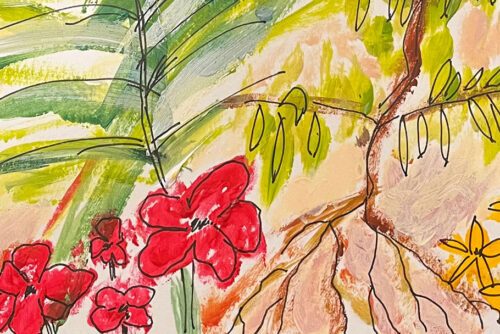The new issue of The Scholar and Feminist Online “Rage, Struggle, Freedom” explores transformative modes of feminist organizing in the face of global crises defined by militarism, state violence, and structural abandonment. Guest edited by Margo Okazawa-Rey and Elif Sarican, this issue marks the first-ever open call for contributions in the journal’s history. We received over a hundred submissions from across the globe — a testament to the urgency of mapping feminist resistance in this moment. Margo Okazawa-Rey brings a wealth of experience to the issue, from her role as a founding member of the Combahee River Collective to her decades of work on gender and militarism, including advocacy with the International Women’s Network Against Militarism (IWNAM). Similarly, Elif Sarican draws on her extensive work in London and beyond around Kurdistan, the Kurdish Women’s Movement, and internationalism. Drawing on their deep commitments to both scholarship and activism, Okazawa-Rey and Sarican bring invaluable perspectives to the state of current international feminist struggles and solidarities.
Divided into four sections — Feminist Self-Defense, Anti-Colonial Memory, Transnational Feminist Solidarities, and Pedagogies of Resistance and Imagination — this issue engages feminist movements’ demands for the right to armed struggle and genuine security, or “security from below” (Käyhkö); the need for representations of active resistance to colonial violence; the reclamation of bodily autonomy and reproductive justice; and the transformation of classrooms and institutions through abolitionist practices. Contributors grapple with what our guest editors describe as a pervasive “culture of killing” marked by militarized violence, deprivation, and extraction of both human and non-human life. In this context how do feminists approach these concerns through political strategy, relational politics, memory work, or imagination? The multi-genre contributions situate feminist organizing within a rich genealogy of movements that bridge global, regional, local, and on-the-ground struggles, reflecting on anti-patriarchal organizing, abolitionist and anti-militarist feminisms, and spirituality and community. They insist on broadening the horizons of freedom and the collective defense of life itself.
In addition, structuring the issue with a prologue, interlude, and epilogue featuring artwork, video, and poetry highlights the storytelling dimension of feminist organizing. These creative forms, which also populate the sections, reflect on how individual and collective lives are narrated, disrupted, and reimagined in these contexts. Rather than presenting a homogenous or universal form of feminist resistance, this approach celebrates the plurality and power of diverse methodologies, driving us toward a politics of life rooted in possibility. As the call for submissions noted, in this issue “the layered, complex, and, often contradictory, relationship between ideology, political practice, and personal, interpersonal, and social relations on these multiple scales is a richness rather than a limitation.” By challenging the “mainstream/whitestream” approach to anti-violence through policing and punishment, the issue amplifies and brings attention to long-standing and emerging international solidarity networks. 1
As I reflect on my first issue as editor of The Scholar and Feminist Online, I feel immense gratitude to our contributors, guest editors, and my editorial team colleagues for their vision and steadfast commitment in bringing this issue to life. Preparing this issue amidst the relentless escalation of genocidal violence and fascism over the past year has been demoralizing and devastating. In this post-election climate we find ourselves bracing to protect our communities with even greater urgency. Together, we have crafted a space to rethink what this moment demands of us. This issue aims to offer more than solace — it brings a renewed sense of determination, rage, solidarity, and resistance in the pursuit of transformative justice and a genuinely secure future.
We are launching this issue today in conjunction with a global activist conversation featuring guest editors and two of the issue’s contributors, Şervîn Nûdem from Jineolojî Academy and Gwyn Kirk from the International Women’s Network Against Militarism. This dialogue will offer further opportunities for exchange, reflection, and action planning, continuing the vital conversations sparked by this issue.
- Angela Y. Davis, Gina Dent, Erica R. Meiners, and Beth E. Richie, Abolition. Feminism. Now (Haymarket Books, 2022), p. ix.[↑]



